你知道多少錢英文單字?學會超過50+個有用的錢相關詞彙!
如何用英文自然地談論金錢而不感到尷尬?掌握完整的錢英文詞彙體系是關鍵,從基礎的 money、dollar 到進階的 rolling in dough、costs an arm and a leg,你需要的不僅僅是單字記憶,而是一套涵蓋正式與非正式場合的完整表達系統。許多英語學習者在面對金錢話題時經常陷入詞窮困境,不知道在銀行該說 deposit 還是 save,或者在朋友聊天時如何自然地表達「沒錢」而不只是重複 "no money"。
在英語國家的日常生活中,金錢話題無所不在——從購物殺價、薪資談判到投資理財,每種情境都有其獨特的語言慣例和文化背景。PREP 教育團隊發現,許多學習者因為缺乏系統性的金錢英文訓練,經常在關鍵時刻無法準確表達,甚至因為用詞不當而產生誤解。這份終極指南將帶你從核心詞彙建構開始,逐步掌握語法重點、生活俚語,並透過實戰練習確保你能在任何場合都自信地用英文談論金錢相關話題,真正做到一篇搞定所有金錢英文需求。
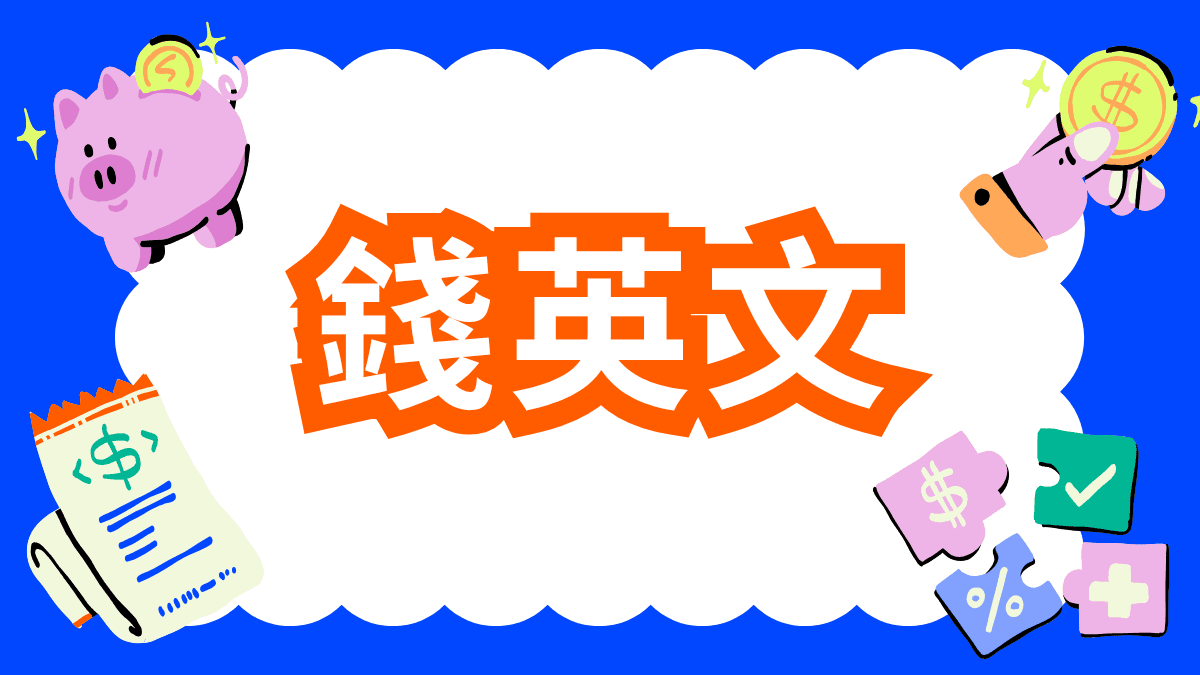
I. 核心錢英文詞彙庫
詞彙是所有語言學習的基石,特別是在金錢英文這個主題上,準確的用詞不僅影響溝通效果,更關係到你在商務或生活場合中的專業形象。以下我們將系統性地建構你的金錢詞彙庫,從具體的實體貨幣到抽象的價值概念,確保你能在各種情境中準確表達。
1. 實體貨幣
|
錢英文詞彙 |
中文翻譯 |
例句 |
|
cash /kæʃ/ n. |
現金 |
I prefer to pay in cash rather than by card. (我偏好用現金付款而非刷卡) |
|
banknote /ˈbæŋknoʊt/ n. |
紙鈔 |
The banknote was torn and the store refused to accept it. (這張紙鈔破了,店家拒收) |
|
coin /kɔɪn/ n. |
硬幣 |
She collected the coins from the fountain for charity. (她把許願池裡的硬幣收集起來做慈善) |
|
bill /bɪl/ n. |
鈔票(美式) |
He pulled out a twenty-dollar bill from his wallet. (他從錢包裡拿出一張二十美元鈔票) |
|
change /tʃeɪndʒ/ n. |
零錢;找零 |
Keep the change as a tip for the excellent service. (零錢留著當小費,服務很棒) |
|
currency /ˈkɜːrənsi/ n. |
貨幣 |
The local currency strengthened against the US dollar. (當地貨幣對美元匯率走強) |
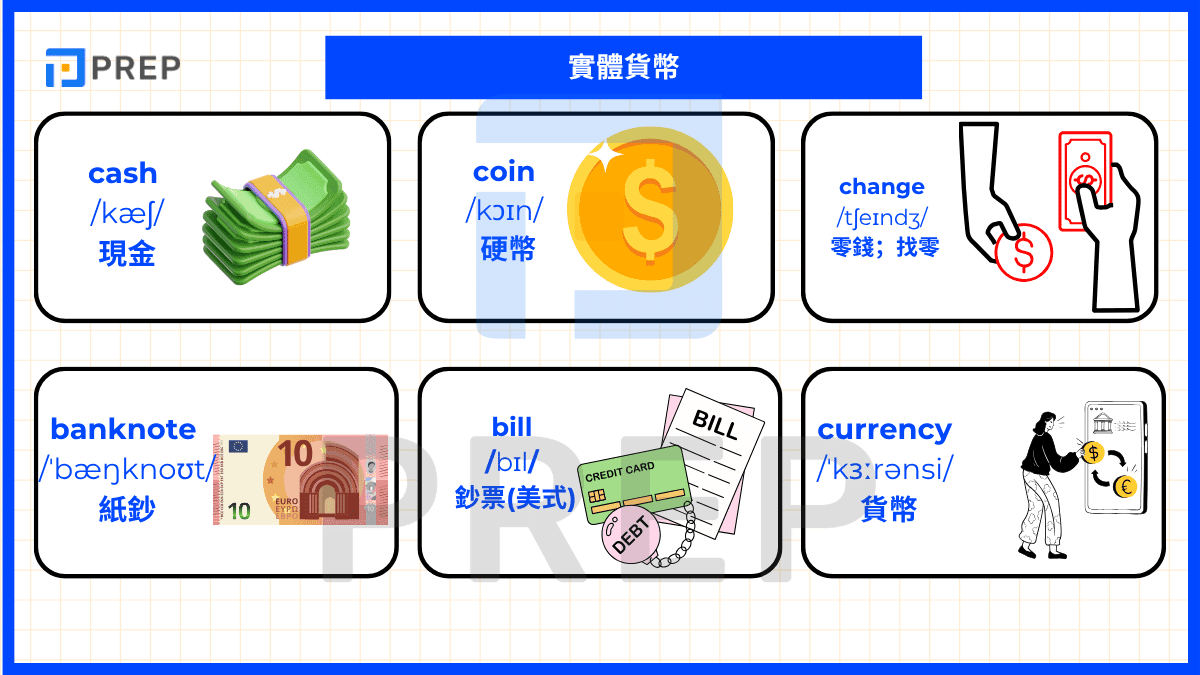
2. 價格與價值的英文
|
錢英文詞彙 |
中文翻譯 |
例句 |
|
price /praɪs/ n. |
價格 |
The price of housing has increased dramatically this year. (今年房價大幅上漲) |
|
cost /kɔːst/ n. |
成本;代價 |
The cost of living in major cities keeps rising. (大城市的生活成本持續上升) |
|
value /ˈvæljuː/ n. |
價值 |
This vintage watch has sentimental value beyond its market price. (這只古董錶的情感價值超越市場價格) |
|
worth /wɜːrθ/ n. |
價值;財富 |
The company's worth doubled after the successful merger. (成功合併後公司價值翻倍) |
|
budget /ˈbʌdʒɪt/ n. |
預算 |
We need to stick to our monthly budget to save for the vacation. (我們需要堅持月度預算來存錢度假) |
|
expense /ɪkˈspens/ n. |
支出;費用 |
Medical expenses can be overwhelming without insurance. (沒有保險的話醫療支出可能很驚人) |
3. 各類貨幣
|
錢英文詞彙 |
中文翻譯 |
例句 |
|
dollar /ˈdɑːlər/ n. |
美元 |
The coffee costs three dollars and fifty cents. (這杯咖啡要三美元五十分) |
|
pound /paʊnd/ n. |
英鎊 |
One pound is currently worth about 1.25 US dollars. (一英鎊目前約值1.25美元) |
|
euro /ˈjʊroʊ/ n. |
歐元 |
Most European countries use the euro as their currency. (大多數歐洲國家使用歐元作為貨幣) |
|
yen /jen/ n. |
日圓 |
One US dollar equals approximately 150 yen today. (今天一美元約等於150日圓) |
|
yuan /juˈɑːn/ n. |
人民幣元 |
The Chinese yuan has gained strength in international markets. (人民幣在國際市場上走強) |
|
peso /ˈpeɪsoʊ/ n. |
披索 |
Mexican pesos are widely accepted in border towns. (墨西哥披索在邊境城鎮廣泛使用) |
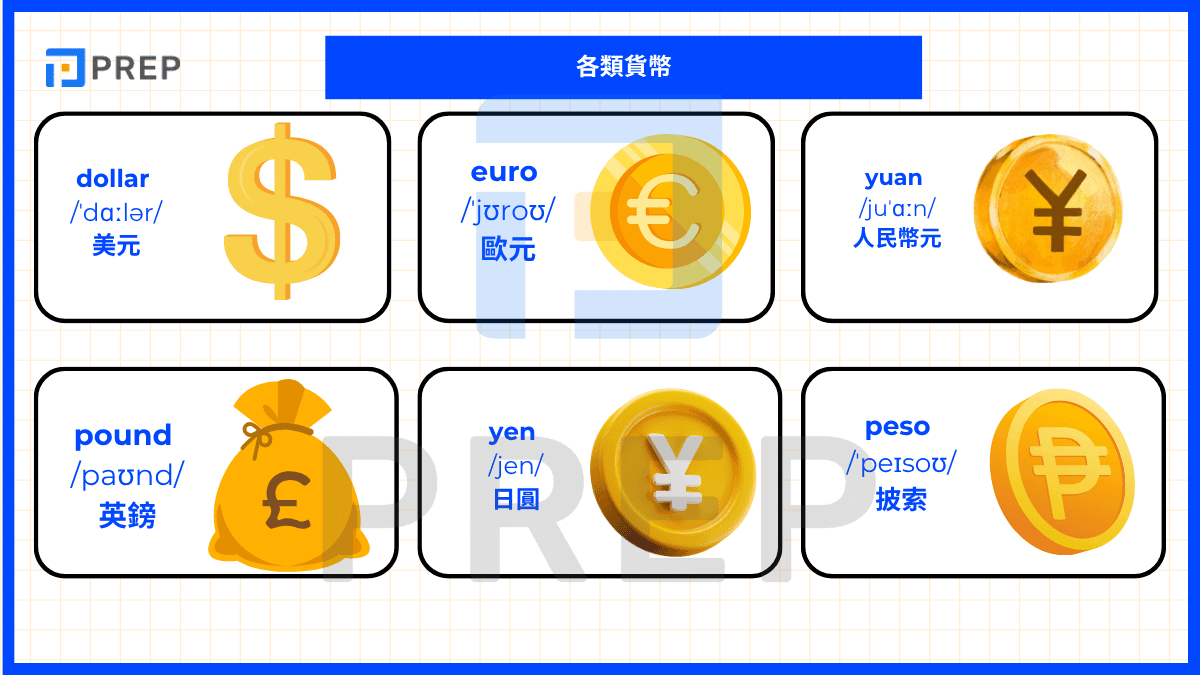
4. 各種支付方式
|
錢英文詞彙 |
中文翻譯 |
例句 |
|
credit card /ˈkredɪt kɑːrd/ n. |
信用卡 |
My credit card was declined at the restaurant. (我的信用卡在餐廳被拒刷) |
|
debit card /ˈdebɪt kɑːrd/ n. |
金融卡 |
Using a debit card helps me control my spending better. (使用金融卡讓我更好地控制支出) |
|
check /tʃek/ n. |
支票 |
He wrote a check for the monthly rent payment. (他開了一張支票付月租) |
|
wire transfer /ˈwaɪər ˈtrænsfər/ n. |
電匯 |
The wire transfer will arrive within two business days. (電匯將在兩個工作日內到達) |
|
mobile payment /ˈmoʊbaɪl ˈpeɪmənt/ n. |
行動支付 |
Mobile payment apps have revolutionized how we shop. (行動支付應用程式改革了我們的購物方式) |
|
cryptocurrency /ˈkrɪptoʊˌkɜːrənsi/ n. |
加密貨幣 |
Cryptocurrency adoption is growing among younger investors. (年輕投資者對加密貨幣的接受度正在提升) |
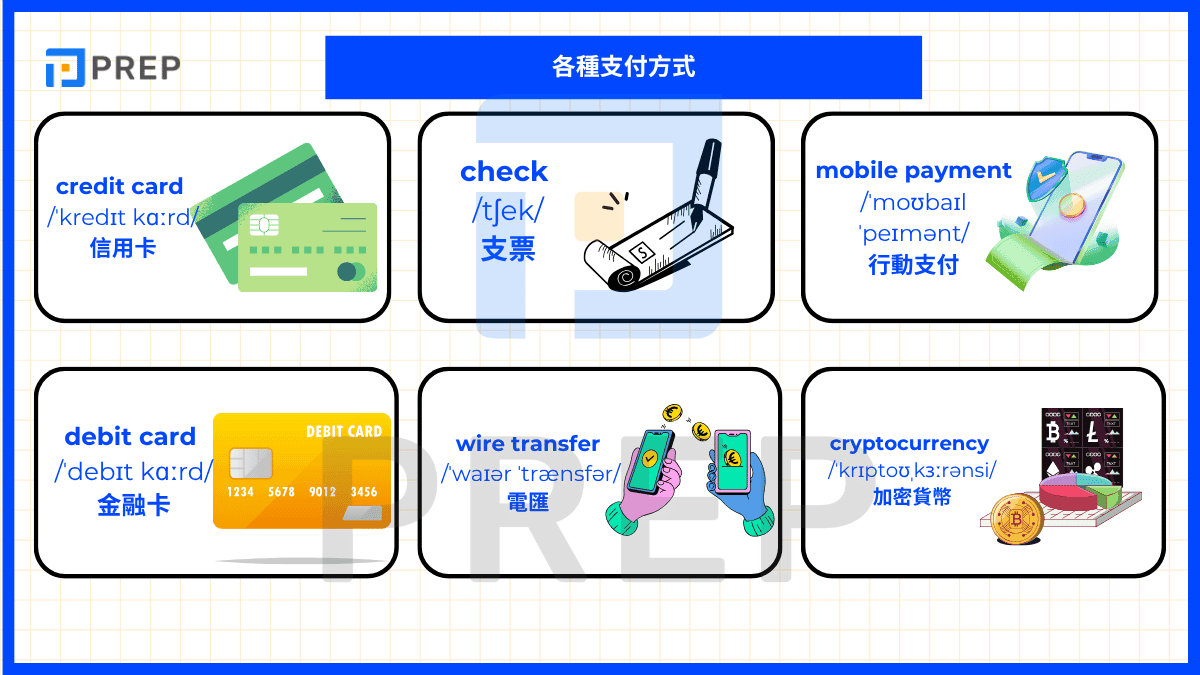
5. 與金錢相關的活動
|
錢英文詞彙 |
中文翻譯 |
例句 |
|
earn /ɜːrn/ v. |
賺取;掙得 |
She earns a decent salary as a software engineer. (她當軟體工程師賺得不錯的薪水) |
|
spend /spend/ v. |
花費;支出 |
We spent too much money on dining out last month. (我們上個月在外用餐花了太多錢) |
|
save /seɪv/ v. |
儲蓄;節省 |
Try to save at least 10% of your monthly income. (試著每月至少儲蓄收入的10%) |
|
invest /ɪnˈvest/ v. |
投資 |
Many people invest in stocks for long-term growth. (許多人投資股票以期長期成長) |
|
borrow /ˈbɑːroʊ/ v. |
借入;借款 |
I need to borrow money from the bank to buy a house. (我需要向銀行借錢買房) |
|
lend /lend/ v. |
借出;放貸 |
The bank agreed to lend us the funds for expansion. (銀行同意借給我們擴張資金) |
6. 銀行與金融術語
|
錢英文詞彙 |
中文翻譯 |
例句 |
|
account /əˈkaʊnt/ n. |
帳戶 |
I need to open a savings account at the local bank. (我需要在當地銀行開設儲蓄帳戶) |
|
balance /ˈbæləns/ n. |
餘額 |
Please check your balance before making any large purchases. (大額購買前請檢查餘額) |
|
interest /ˈɪntrəst/ n. |
利息 |
The interest rate on this loan is quite reasonable. (這筆貸款的利率相當合理) |
|
loan /loʊn/ n. |
貸款 |
They applied for a loan to buy their first home. (他們申請貸款購買第一間房子) |
|
mortgage /ˈmɔːrɡɪdʒ/ n. |
房貸 |
The mortgage payments will be due on the first of each month. (房貸每月一號到期) |
|
deposit /dɪˈpɑːzɪt/ n. |
存款;押金 |
You need to make a deposit of at least $500 to open this account. (開設此帳戶需要至少存入500美元) |
7. 金錢相關形容詞
|
錢英文詞彙 |
中文翻譯 |
例句 |
|
affordable /əˈfɔːrdəbl/ adj. |
負擔得起的 |
This restaurant offers affordable meals for students. (這家餐廳為學生提供負擔得起的餐點) |
|
expensive /ɪkˈspensɪv/ adj. |
昂貴的 |
Designer handbags are often too expensive for most people. (設計師手袋對大多數人來說太昂貴了) |
|
cheap /tʃiːp/ adj. |
便宜的 |
Don't buy cheap electronics; they usually break quickly. (別買便宜的電子產品,通常很快就壞) |
|
overpriced /ˌoʊvərˈpraɪst/ adj. |
定價過高的 |
The concert tickets seem overpriced for what they're offering. (演唱會門票相對於所提供的內容似乎定價過高) |
|
reasonable /ˈriːznəbl/ adj. |
合理的 |
The hotel charges reasonable rates during the off-season. (這家飯店在淡季收取合理的費用) |
|
worthwhile /ˌwɜːrθˈwaɪl/ adj. |
值得的 |
The investment course was worthwhile despite the high cost. (儘管費用高昂,這個投資課程是值得的) |
II. 區分一些容易混淆的與錢相關的英語動詞
中文母語者在使用錢的英文表達時,最容易在動詞選擇上出錯,這主要源於兩種語言在語法結構上的根本差異。掌握正確的動詞用法不僅能避免尷尬的語法錯誤,更能讓你的英語表達更加精準自然。
1. Spend vs. Cost 的關鍵區別
許多學習者會說「This book costs me 500 dollars」,但正確的表達應該是「I spent 500 dollars on this book」或「This book costs 500 dollars」。關鍵在於理解主詞的不同:spend 的主詞必須是「人」,表示某人花錢;而 cost 的主詞是「物品」,表示某物品的價格。當你想強調自己花了多少錢時,使用「I spent...」;當你想說明某物品的價格時,使用「It costs...」。
2. Borrow vs. Lend 的方向性
另一個常見錯誤是混淆 borrow 和 lend 的使用。記住這個簡單原則:borrow 是「借入」,從別人那裡借東西到自己手中;lend 是「借出」,把自己的東西借給別人。例如,「Can I borrow your pen?」(我可以借用你的筆嗎?) 和「Can you lend me your pen?」(你可以把筆借給我嗎?) 雖然中文意思相近,但英文的主語和動詞選擇完全不同。這個區別在談論金錢時尤其重要,因為它涉及資金流向的準確表達。
III. 金錢相關英文慣用語大全
掌握了基礎詞彙和語法後,接下來就是讓你的現金英文表達更上一層樓的關鍵——學會使用母語人士的俚語和慣用語。這些表達不僅能讓你的英語聽起來更自然,也能幫助你更好地理解英語母語者的對話。以下按照不同主題分類整理常用的金錢相關慣用語:
|
慣用語 |
中文意思 |
例句 |
|
表達富有 |
||
|
be loaded |
很有錢 |
He's loaded - he just bought his third sports car. (他很有錢,剛買了第三台跑車) |
|
rolling in dough |
非常富有 |
After winning the lottery, she's rolling in dough. (中獎後她非常富有) |
|
well-off |
富裕的 |
The family is quite well-off thanks to their successful business. (這家人因為成功的事業而相當富裕) |
|
have deep pockets |
財力雄厚 |
The company has deep pockets and can afford the expansion. (公司財力雄厚,負擔得起擴張) |
|
表達貧窮 |
||
|
be broke |
身無分文 |
I can't go out tonight - I'm completely broke. (我今晚不能出去,完全沒錢了) |
|
strapped for cash |
缺錢 |
We're strapped for cash until the next paycheck arrives. (在下次發薪前我們都很缺錢) |
|
living paycheck to paycheck |
月光族 |
Many families are living paycheck to paycheck in this economy. (在這種經濟環境下,許多家庭都是月光族) |
|
hard up |
經濟困難 |
Since losing his job, he's been pretty hard up. (失業後他經濟狀況很困難) |
|
描述價格 |
||
|
cost an arm and a leg |
非常昂貴 |
That designer dress costs an arm and a leg. (那件設計師洋裝非常昂貴) |
|
dirt cheap |
非常便宜 |
These vegetables are dirt cheap at the farmer's market. (這些蔬菜在農夫市集非常便宜) |
|
bang for your buck |
物超所值 |
This restaurant gives you great bang for your buck. (這家餐廳物超所值) |
|
highway robbery |
漫天要價 |
Charging $20 for a sandwich is highway robbery! (一個三明治要20美元根本是漫天要價!) |
|
金錢管理 |
||
|
tighten one's belt |
勒緊褲帶 |
We need to tighten our belts and reduce unnecessary spending. (我們需要勒緊褲帶,減少不必要的支出) |
|
save for a rainy day |
未雨綢繆 |
It's wise to save for a rainy day in case of emergencies. (為了應對緊急情況,未雨綢繆是明智的) |
|
penny-pinching |
精打細算 |
Her penny-pinching habits helped her save enough for college. (她精打細算的習慣幫她存夠了大學費用) |
|
money talks |
金錢萬能 |
In this business, money talks louder than anything else. (在這行業裡,金錢比任何東西都管用) |
|
花錢習慣 |
||
|
throw money around |
揮霍金錢 |
He likes to throw money around to impress people. (他喜歡揮霍金錢來給人留下印象) |
|
burn money |
燒錢 |
That startup is burning money faster than they can raise it. (那家新創公司燒錢的速度比募資還快) |
|
money down the drain |
錢打水漂 |
Buying that broken car was money down the drain. (買那台故障車完全是錢打水漂) |
|
get your money's worth |
物有所值 |
The concert was amazing - we definitely got our money's worth. (演唱會太棒了,我們絕對物有所值) |
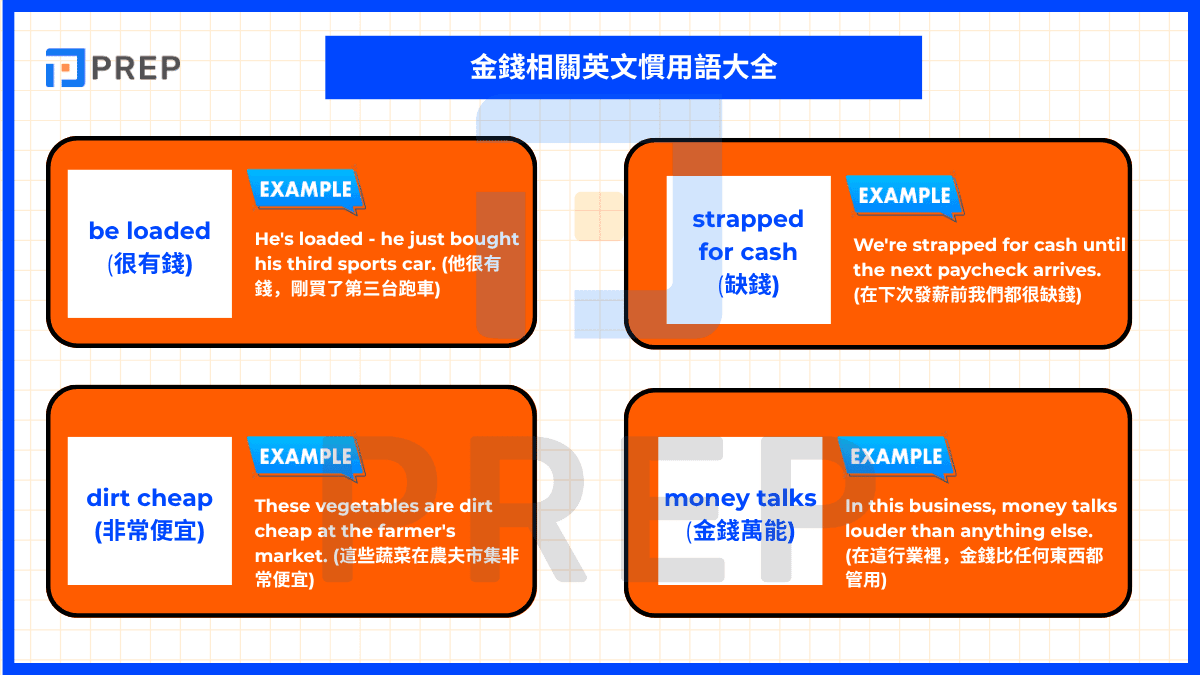
IV. 實戰練習 — 測試你的金錢英文掌握度
理論學習固然重要,但唯有透過實際練習才能真正內化這些錢英文知識。以下兩個練習將測試你對核心詞彙、語法重點以及慣用語的理解程度,幫助你發現學習盲點並強化記憶。
1. 練習一
選出最合適的英文單字完成每個句子:
-
I don’t use a credit card — I prefer to pay with ________.
A. loan
B. deposit
C. cash -
That rare collector’s coin is no longer used as regular ________.
A. expense
B. currency
C. value -
I bought lunch for $8 and gave the cashier a $10 bill. She gave me $2 ________.
A. worth
B. change
C. loan -
The ________ was crumpled, so the vending machine wouldn't accept it.
A. card
B. banknote
C. coin -
That's a very old ________ from the Ming dynasty — it's made of bronze!
A. bill
B. coin
C. dollar -
He earns a good salary, but they still find it hard to manage their monthly ________.
A. expenses
B. interests
C. savings -
The hotel room is beautiful and spacious, but it’s way too ________ for my travel budget.
A. expensive
B. affordable
C. cheap -
I need to check my bank account ________ before making that big purchase.
A. cost
B. balance
C. coin -
She paid her rent by writing a ________ to her landlord.
A. check
B. card
C. cash -
He used a ________ app on his phone to pay for coffee.
A. mobile payment
B. coin
C. bill
2. 練習二
將正確的單字填入空格中:
|
cash · card · loan · currency · worth · price · budget · invest · borrow · save |
-
I don’t like to use a ________ when shopping online. I prefer using digital wallets.
-
He wants to ________ his money in stocks and real estate in the near future.
-
After paying my rent and bills, I didn’t have much money left to put into my ________ this month.
-
Most people need to take out a ________ to buy a house.
-
I always try to ________ at least 15% of my income every month.
-
The foreign ________ is stored in a separate wallet for travel purposes.
-
That new phone is too expensive — it’s not ________ the cost for me.
-
Can I ________ $100 from you until next week?
-
You should always check the ________ before buying anything online.
-
I paid the coffee shop in ________ because they didn’t accept cards.
3. 練習答案
|
練習一 |
練習二 |
|
|
V. 常見問題解答 (FAQs & Unique Questions)
1. Salary, Wage, Income 到底有什麼不同?
這三個詞在中文都可以翻譯為「收入」,但在英文中有明確的區別。Salary 指的是年薪或月薪,通常是固定金額,按月或按年支付給全職員工,例如「My annual salary is $60,000」。Wage 指的是時薪或日薪,通常按小時計算,多用於兼職或體力勞動工作,如「The minimum wage is $15 per hour」。Income 則是最廣泛的概念,包含所有收入來源,不僅限於工作收入,還包括投資、租金等各種收入,比如「His total income includes salary, dividends, and rental income」。
2. 美式英文和英式英文在「錢」的用法上有何主要區別?
|
美式英文 |
英式英文 |
中文意思 |
|
bill |
note |
紙鈔 |
|
checking account |
current account |
活期帳戶 |
|
ATM |
cashpoint |
自動提款機 |
|
quarter (25 cents) |
- |
二十五分硬幣 |
|
bucks (俚語) |
quid (俚語) |
錢、元 |
這些差異主要體現在日常用語中,在正式商務場合,兩種英文的用法趨於一致。了解這些區別有助於你在不同的英語環境中更準確地溝通。
3. 在英語系國家,常見的銀行帳戶類型有哪些?
最基本的兩種帳戶類型是 Checking Account(活期帳戶)和 Savings Account(儲蓄帳戶)。Checking Account 主要用於日常交易,如付帳單、購物,通常配有支票簿和金融卡,資金可以隨時提取但利息很少或沒有利息。Savings Account 則專門用於儲蓄,利息較高但提取次數有限制,適合存放不常使用的資金。此外還有 Money Market Account(貨幣市場帳戶),結合了兩者的特點,利息比儲蓄帳戶高但要求最低餘額更高。對於留學生或新移民來說,了解這些帳戶類型有助於更好地管理個人財務。
4. 在任何場合用 bucks 來代替 dollars 都合適嗎?
答案是否定的。Bucks 是 dollars 的非正式俚語表達,只適用於輕鬆、非正式的場合,如朋友間聊天、日常購物等。在正式場合如商務會議、法律文件、學術寫作或與陌生人的正式交談中,應該使用 dollars。例如,你可以對朋友說「Can you lend me twenty bucks?」,但在銀行或正式合約中必須說「twenty dollars」。掌握這種語言的得體性是展現英語溝通素養的重要標誌,也是建立專業形象的關鍵要素。
結論
從 Money 到 Fluent 的轉變不是一蹴而就的過程,而是需要持續練習和實際應用才能達成的目標。真正的語言掌握來自於將所學知識轉化為自然反應的能力,這需要你在日常生活中創造使用錢英文的機會。
下次購物時,試著在心裡用英文描述價格和支付方式;觀看英語財經新聞或商業電影時,特別注意主持人和角色如何談論金錢;甚至可以嘗試用英文記錄每日開支,這些看似簡單的練習能夠有效地將被動學習轉化為主動應用。記住,語言學習最終的目標不是完美無缺地背誦詞彙,而是能夠在真實情境中自信地溝通表達。
當你能夠自然地在適當場合選擇 salary 而非 wage,能夠不假思索地說出「That costs an arm and a leg」來形容昂貴物品,並且清楚區分 borrow 和 lend 的使用時機時,你就已經成功地將這些知識內化為語言直覺了。持續的練習和應用將讓你在面對任何與金錢相關的英語交流時都能夠展現出母語人士般的流利和自信。

你好!我叫黃秋賢。現在在網站 prepedu.com 的部落格擔任產品內容經理。
我有超過5年的英語、韓語等外語自學經驗,並準備過 IELTS、TOEIC、TOPIK 等考試,累積了豐富的實戰知識,也曾協助數千位在語言學習上遇到困難的人。希望以上的分享能幫助大家在家中更有效率地自學!
評論











